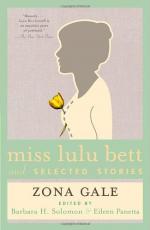And Lulu, peeping through the blind.
When “tea” had been experienced that evening, it was found that a light rain was falling and the Deacons and their guests, the Plows, were constrained to remain in the parlour. The Plows were gentle, faintly lustrous folk, sketched into life rather lightly, as if they were, say, looking in from some other level.
“The only thing,” said Dwight Herbert, “that reconciles me to rain is that I’m let off croquet.” He rolled his r’s, a favourite device of his to induce humour. He called it “croquette.” He had never been more irrepressible. The advent of his brother was partly accountable, the need to show himself a fine family man and host in a prosperous little home—simple and pathetic desire.
“Tell you what we’ll do!” said Dwight. “Nin and I’ll reminisce a little.”
“Do!” cried Mr. Plow. This gentle fellow was always excited by life, so faintly excited by him, and enjoyed its presentation in any real form.
Ninian had unerringly selected a dwarf rocker, and he was overflowing it and rocking.
“Take this chair, do!” Ina begged. “A big chair for a big man.” She spoke as if he were about the age of Monona.
Ninian refused, insisted on his refusal. A few years more, and human relationships would have spread sanity even to Ina’s estate and she would have told him why he should exchange chairs. As it was she forbore, and kept glancing anxiously at the over-burdened little beast beneath him.
The child Monona entered the room. She had been driven down by Di and Jenny Plow, who had vanished upstairs and, through the ventilator, might be heard in a lift and fall of giggling. Monona had also been driven from the kitchen where Lulu was, for some reason, hurrying through the dishes. Monona now ran to Mrs. Bett, stood beside her and stared about resentfully. Mrs. Bett was in best black and ruches, and she seized upon Monona and patted her, as her own form of social expression; and Monona wriggled like a puppy, as hers.
“Quiet, pettie,” said Ina, eyebrows up. She caught her lower lip in her teeth.
“Well, sir,” said Dwight, “you wouldn’t think it to look at us, but mother had her hands pretty full, bringing us up.”
Into Dwight’s face came another look. It was always so, when he spoke of this foster-mother who had taken these two boys and seen them through the graded schools. This woman Dwight adored, and when he spoke of her he became his inner self.
“We must run up-state and see her while you’re here, Nin,” he said.
To this Ninian gave a casual assent, lacking his brother’s really tender ardour.
“Little,” Dwight pursued, “little did she think I’d settle down into a nice, quiet, married dentist and magistrate in my town. And Nin into—say, Nin, what are you, anyway?”
They laughed.
“That’s the question,” said Ninian.




